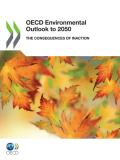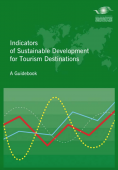
Based on joint modelling by the OECD and the Netherlands Environmental Assessment Agency (PBL), this document looks forward to the year 2050 to find out what demographic and economic trends might mean for the environment if the world does not adopt more ambitious green policies. It also looks at what policies could change that picture for the better. This Outlook focuses on four areas: climate change, biodiversity, freshwater and health impacts of pollution, identified as 'red light' issues by the previous 'Environmental Outlook to 2030' publication. This summary was prepared by Eldis.

This report suggests a conceptual framework for the new statistical field “ICT and the environment” based on an existing OECD framework for information society statistics. Sources of official data to populate the framework are investigated and some relevant work has been identified. Given the serious environmental problems facing the world, and the potential for ICT to both lessen and worsen those problems, it is suggested that this field should be of more interest to official statisticians. A number of actions are recommended and they include: conducting new or expanded household and business surveys, expanding statistical classifications to better reflect ICT and the environment, ensuring that sample sizes are sufficient to enable better identification of ICT and environment data, and producing time series data on the topic. This summary was prepared by Eldis.
Mitigation and adaptation climate change policy cuts across all sectors of the economy and broader national priorities, such as poverty alleviation, sustainable development and economic growth. This paper outlines the evolution of the low-emission development strategies (LEDS) concept in the climate policy discourse and explores the existing strategies, action plans and documents. It defines LEDS as forward-looking national development strategies that encompass climate-resilient economic growth and looks at how they can ensure that they are effective and efficient in delivering intended goals. The aim of the paper is to:
Investment in network infrastructure can boost long-term economic growth in OECD countries. Moreover, infrastructure investment can have a positive effect on growth that goes beyond the effect of the capital stock because of economies of scale, the existence of network externalities and competition enhancing effects. This paper, which is part of a project examining the links between infrastructure and growth and the role of public policies, reports the results on the links with growth from a variety of econometric approaches. Time-series results reveal a positive impact of infrastructure investment on growth. They also show that this effect varies across countries and sectors and over time. In some cases, these results reveal evidence of possible over-investment, which may be related to inefficient use of infrastructure. Bayesian model averaging of cross-section growth regressions confirm that infrastructure investment in telecommunications and the electricity sectors has a robust positive effect on long-term growth (but not in railways and road networks). Furthermore, this effect is highly nonlinear as the impact is stronger if the physical stock is lower.
